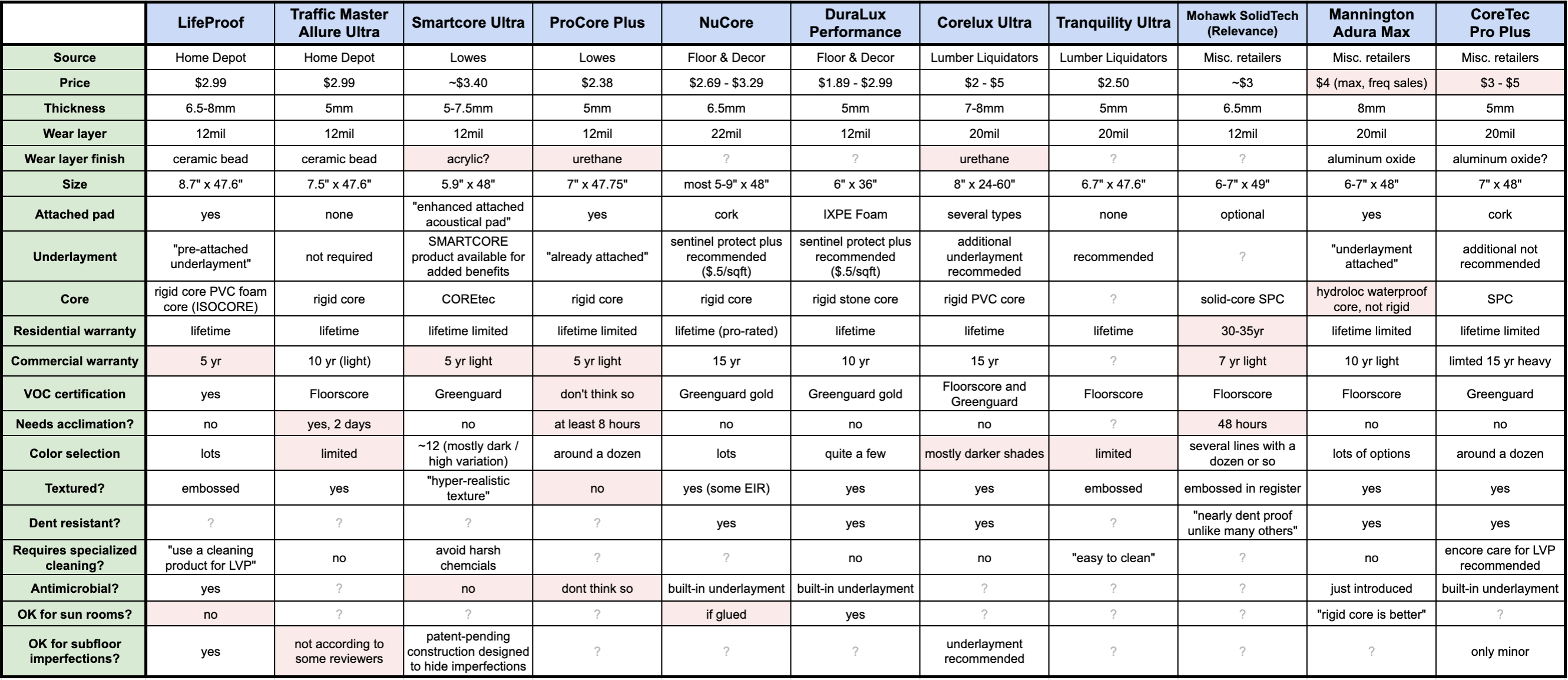We often take on home improvement projects and want to share our experiences with you! In this first post of our “Home Improvement Solutions” series, we’ll share some research we did on different brands of luxury vinyl plank flooring as we were shopping for flooring to install in one of our homes.
What is Luxury Vinyl Plank?
Luxury Vinyl Plank (or LVP) is a somewhat new type of floor covering that has increased in popularity over the last decade or so. Fans of LVP love that it’s generally waterproof, durable, can be less expensive than other types of flooring, and comes in a wide array of design options – the manufacturers have gotten very good at mimicking the look of actual wood for a huge variety of wood species, to the extent that sometimes appraisers can even mistake LVP for actual hardwood flooring!
The “luxury” part of the name is intended to drive home the point that this type of vinyl is not the classic thin sheet vinyl that most people will think of when they hear “vinyl” – it’s a new product entirely. Luxury vinyl also comes in more tile-like shapes (LVT) that are designed to look like stone.
What are good Luxury Vinyl Plank brands?
If you’re considering installing LVP in your home, you may have started doing some research and gotten quickly overwhelmed by all of the available options! Each of the big box stores has several lines of the product, and there are many different factors to consider as you make your decision. One of the first things you’ll likely notice is that LVP comes in varieties that are designed to be glued to the floor, as well as those consisting of planks that lock together with a tongue-and-groove system and simply “float” over the top of the floor rather than being adhered to it. Further, LVP comes in varying thicknesses (from 2mm or even less, to greater than 8mm), with different types of material for the top “wear layer,” different types of “core” construction – the list goes on.
In order to wrap our heads around all of the available options, we put together the comparison chart below. We first narrowed our search to floating LVP at least 5mm thick, with a wear layer thicker than 6mil (a “mil” is 1/1000 of an inch), in the ~$2-4 price range. The most important factor for our decision was durability at a good value, so we were particularly interested in a thicker floor with a good wear layer (we also hoped that a thicker floor would help to hide minor imperfections in the plywood subfloor). We researched several of the more prominent brands offering LVP that fit these criteria and compiled them into this chart. All claim to be waterproof, scratch resistant, and stain resistant. Some have multiple lines with other features and the chart just shows the line that most closely matched our criteria. Some cells are highlighted in pink if the value is particularly less than ideal. We should note also that most of this research was done in August 2020 – some things will change over time, but hopefully this is still a helpful overview!
For a larger version, click here.
We also made note of various helpful reviews:
LifeProof +s: “best overall,” “ easy to install, great value
LifeProof -s: “tabs break during install”
TM Allure Ultra +s: “held up great”
TM Allure Ultra -s: negative reviews on houzz, subfloor unevenness issues
Smartcore Ultra -s: negative reviews on houzz
NuCore +s: “great over imperfect subfloor”
NuCore -s: “shouldn’t be used in wet rooms”
DuraLax -s: weight limit and issues with area rugs
Mohawk SolidTech -s: lots of bad reviews on floorcritics
CoreTec Pro Plus +s: great product at great price
We ended up going with CoreTec ProPlus since we found it on sale for $2.50, and we’re actually not very happy with it! We think mainly we didn’t think enough about the design since we were primarily concerned with durability, and we really don’t like the one we chose (Chesapeake Oak). Some reviews say that the CoreTec ProPlus is less expensive than other CoreTec lines in part because the designs are less realistic, and we definitely see that. Further, the CoreTec ProPlus LVP did not hide minor imperfections in the subfloor as much as we hoped it would with its rigid core construction! Likely a floor thicker than 5mm would be better.
We hope that our research and experience helps you!


